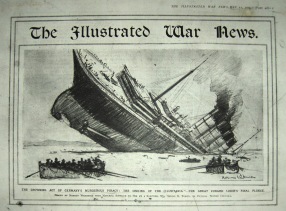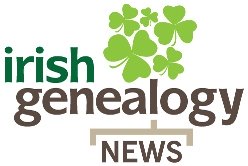Using historical Irish
newspapers for genealogy research
The gems inside historical Irish newspapers have only recently become a staple of genealogical research. This might have been because newspaper collections were held in only a few major repositories, so a personal visit was required.

But it was also because, without an index, any research project was incredibly time-consuming, as the family historian waded through page after over-sized page. Microfilm didn't make the task much easier, either.
Fortunately, the last few years have seen a bit of a revolution in newspaper archiving, and this has really opened up incredibly exciting and enjoyable resources.
The only negative is that it's terribly easy to get side-tracked!
You can find details below of online Irish newspaper resources. (For offline resources, see the Free historical Irish newspapers page.)
The value of historical Irish newspapers
Historical newspapers can be useful in a number of ways:
- Birth, engagement, marriage and death announcements: The hatch, match and despatch columns used to be one of the most popular sections of newspapers and can still provide the all-important basic data for your family tree. Often a bit of additional information is supplied as a bonus. Placing such announcements was obviously not a high priority for the average poor labourer's family, but if your ancestors had a few bob or a certain social status above the bottom rungs, you may find announcements of interest. BMD announcements in old Irish newspapers can be especially useful for the pre-civil registration era in areas where no church registers survive, or where records seem to be missing.
- Leads: Many news stories will provide snippets of information that you may not already have, or that can direct your research to new resources. Names, ages, residence/place of origin, occupations and marital status are the standard components of any news feature, so these details may be recorded not only about the subject of the story but also about his/her spouse, offspring and wider family. Obituaries, in particular, can be extremely useful for this kind of information; and they're not just the preserve of the rich or remarkable – a report in a local newspaper of the 1892 funeral of one of my ancestors read like an obituary, with its references to his shop and some of the community events in which he'd been involved.
Toolkit Search Tip
As with any searchable online collection, OCR (optical character recognition) technology may not pick up the correct spelling of the names or words you are searching for.
It's also possible that the journalist mis-spelt the name or word in the original article.
It's also perfectly possible that the name or the placename is open to all manner of spellings.
To help find matches in old newspaper archives, search for variants, use wildcards (where applicable) or try using Advanced Search options to focus on specific dates and/or places.
- Leads: Many news stories will provide snippets of information that you may not already have, or that can direct your research to new resources. Names, ages, residence/place of origin, occupations and marital status are the standard components of any news feature, so these details may be recorded not only about the subject of the story but also about his/her spouse, offspring and wider family. Obituaries, in particular, can be extremely useful for this kind of information; and they're not just the preserve of the rich or remarkable – a report in a local newspaper of the 1892 funeral of one of my ancestors read like an obituary, with its references to his shop and some of the community events in which he'd been involved.
- Insight to character: Historical Irish newspapers can provide more of an insight into your ancestors' lives and characters than regular genealogical documentation. The level of detail in some reports – criminal proceedings, inquests, marriage scandals and other sensational stories – can be a real eye-opener. My own example, albeit not exactly sensational, concerns my gt gt grandmother, Sophia, who was born in 1840 into a prominent and reasonably prosperous (but not wealthy) sea-faring family from Wicklow Town. Family tales had held her up as a beacon of saintliness. So I was rather surprised (and rather delighted, to be honest) to find several entries in the Petty Sessions Order Books relating to her regular altercations with neighbours. Newspaper reports of these court appearances painted a completely different view to the butter-wouldn't-melt, slightly snooty picture that had filtered down the years.
- Backdrop ‐ your ancestor's social scene: If you want information about your ancestor's locality, a contemporary newspaper can be a treasure trove. And not just in the news stories. Adverts, too, tell you a lot about the area, the neighbours, and the kind of products they might have bought or aspired to buy. You can also find details of local markets – when and where they were held, and even the price of eggs, butter and more. And then there are reports of community events such as dances, sporting challenges, agricultural shows, and the meetings of local political and social organisations.
Toolkit Search Tip
As with any searchable online collection, OCR (optical character recognition) technology may not pick up the correct spelling of the names or words you are searching for.
It's also possible that the journalist mis-spelt the name or word in the original article.
It's also perfectly possible that the name or the placename is open to all manner of spellings.
To help find matches in old newspaper archives, search for variants, use wildcards (where applicable) or try using Advanced Search options to focus on specific dates and/or places.
- Insight to character: Historical Irish newspapers can provide more of an insight into your ancestors' lives and characters than regular genealogical documentation. The level of detail in some reports – criminal proceedings, inquests, marriage scandals and other sensational stories – can be a real eye-opener. My own example, albeit not exactly sensational, concerns my gt gt grandmother, Sophia, who was born in 1840 into a prominent and reasonably prosperous (but not wealthy) sea-faring family from Wicklow Town. Family tales had held her up as a beacon of saintliness. So I was rather surprised (and rather delighted, to be honest) to find several entries in the Petty Sessions Order Books relating to her regular altercations with neighbours. Newspaper reports of these court appearances painted a completely different view to the butter-wouldn't-melt, slightly snooty picture that had filtered down the years.
- Backdrop ‐ your ancestor's social scene: If you want information about your ancestor's locality, a contemporary newspaper can be a treasure trove. And not just in the news stories. Adverts, too, tell you a lot about the area, the neighbours, and the kind of products they might have bought or aspired to buy. You can also find details of local markets – when and where they were held, and even the price of eggs, butter and more. And then there are reports of community events such as dances, sporting challenges, agricultural shows, and the meetings of local political and social organisations.
Top online resources for historical Irish newspapers
Irish Newspaper Archive: As you can see from the image below, the Dublin-based Irish Newspaper Archive (INA) has a wide range of national, national and local papers available on subscription. At mid-December 2022, its database holds more than six million pages from titles published across the island. Many of the newspapers are available from their very first edition to the current day.
INA has long been one of my top sources for information that tells me about the kind of people I'm descended from, and the lives they and their families led. My paternal ancestors, for example, were labourers from West Cork and they crop up on occasion in news reports of various social meetings and political rallies, or for sporting prowess or for attending funerals or for emigrating.
None of it's earth-shattering, but it helps to make them people, rather than just names attached to birth and death dates.
The database is made up of old papers from across the island, and includes national and local titles. Some have a complete run; some do not. The Belfast Newsletter, for example, is missing some editions but it spans 1738 to 1900. The same applies to its holding of Freeman's Journal, which was published from 1763 to 1924.
These two examples are reminders to always check the dates of coverage if you are looking for specific information from a particular time in your family history.
The site holds complete runs of both The Irish Independent and The Irish Press, which date from 1905 and 1931 respectively.
British Newspaper Archive:
This online resource, launched in 2013, is a partnership between the
British Library and the owners of FindMyPast. It aimed to digitise up to
40 million newspaper pages from the British Library's vast collection
by 2021. This collection includes papers from the UK, Ireland and former British colonies and is still growing with more than 62 million pages of local, regional, national and international titles available to access online at December 2022.
It is now one of the major genealogical resources available to those with ancestors from the geographical British Isles.
As you'd expect, the bulk of the archive is made up of English, Scottish and Welsh papers. These publications can be extremely useful to family historians of Irish heritage because so many of our ancestors settled or spent time on the British mainland.
However, by mid-December 2022 some 260+ historical Irish newspapers had made their way into the database. As well as some of the 'national news' papers – the Belfast Newsletter, Freeman's Journal and Cork/Irish Examiner – a host of local and regional titles are included. Many of the latter have evocative names: Galway Vindicator, the Sligo Champion, the Downshire Protestant and the Wexford Conservative.
The BNA's entire holding is also available via FindMyPast as part of some subscription packages.
British Newspaper Archive: British Newspaper Archive: This online resource, launched in 2013, is a partnership between the British Library and the owners of FindMyPast. It aimed to digitise up to 40 million newspaper pages from the British Library's vast collection by 2021. This collection includes papers from the UK, Ireland and former British colonies and, at December 2022, spans three centuries and holds more than 62 million pages of local, regional, national and international titles.
As you'd expect, the bulk of the archive is made up of English, Scottish and Welsh papers; these can be extremely useful to family historians of Irish heritage because so many of our ancestors settled or spent time on the British mainland.
However, by December 2022, some 260+ historical Irish newspapers had made their way into the database. As well as some of the 'national news' papers – the Belfast Newsletter, Freeman's Journal and Cork/Irish Examiner – a host of local and regional titles are included. Many of the latter have evocative names: Galway Vindicator, the Sligo Champion, the Downshire Protestant and the Wexford Conservative.
The BNA's entire holding is also available via FindMyPast as part of some subscription packages.
Irish Times Archive: The Irish Times Archive is undoubtedly one of the most significant single collection of Irish historical newspapers currently available online.
The paper dates back to 1859 and has been regarded as Ireland's newspaper of record since the early 20th century. Its archive includes almost every issue published in the last 150 years and holds 16m articles.
At November 2022, subscription rates start at €12 / £10 a month.
It's worth noting that access to the Irish Times Archive is provided free of charge at public libraries and schools in Ireland via AskAboutIreland.
Ancestry and FindMyPast: Both these suppliers of online family history records hold collections of historical Irish newspapers. Their respective offers are summarised in the right hand column of this page.
Ancestry and FindMyPast: Both these suppliers of online family history records hold collections of historical Irish newspapers. Their respective offers are summarised below.





